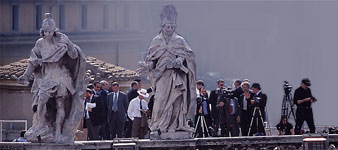In this presentation, we would like to reflect on the concept of quality in media relations. Our investigation starts, on the one side, from the analysis of four scholars from the public relations: Edward L. Bernays, Scott M. Cutlip, Fraser P. Seitel and James E. Grunig. Secondly, we analyze four scholars from journalism: Michael Schudson, Jay Rosen, James Carey and Tom Rosenstiel.
One of our objectives is to arrive at some elements of quality common to diverse authors. It is looking forward a model of "quality media relations" which is applicable not only to the media relations of commercial organizations but even to other institutions, including non-profit institutions. At the same time, we are searching some common elements that can be called "quality journalism". In the final part of the presentation, it is desired to verify whether these quality characteristics of media relations are, with some modifications and adjustments, applicable for Church organizations.
The essential and immediate public of media relations activities is journalists. Being a quality media relations practitioner means helping journalists to do their work better in a professional and successful way. A good journalist, on the other hand, keeps a professional media relations practitioner as his credible source for information. This paper of quality in both media relations and journalism shows many points of healthy and possible collaboration between the media relations practitioners, who looks to improve their work guided by the parameters of excellence, and journalists, who seek also to do their work as best as they can.
One of the important conclusions that emerge from this study is that the media relations person for the Church organizations must be an "expert" because the present world demands too much and only a professional can satisfy the needs of the media effectively. There are no shortcuts to quality media contacts other than being professional. Such persons could entertain and satisfy the reporters and can create good ties with the media.



